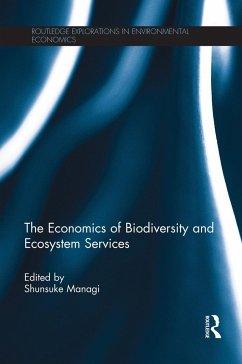
Selling Forest Environmental Services
Market-Based Mechanisms for Conservation and Development
Herausgeber: Pagiola, Stefano; Landel-Mills, Natasha; Bishop, Joshua
Versandkostenfrei!
Versandfertig in 1-2 Wochen
71,99 €
inkl. MwSt.
Weitere Ausgaben:

PAYBACK Punkte
36 °P sammeln!
The risks posed by forest destruction throughout the world are highly significant for all. Not only are forests a critical source of timber and non-timber forest products, but they provide environmental services that are the basis of life on Earth. However, only rarely do beneficiaries pay for the goods and services they experience, and there are severe consequences as a result for the poor and for the forests themselves. It has proved difficult to translate the theory of market-based approaches into practice. Based on extensive research and case studies of biodiversity conservation, watershed...
The risks posed by forest destruction throughout the world are highly significant for all. Not only are forests a critical source of timber and non-timber forest products, but they provide environmental services that are the basis of life on Earth. However, only rarely do beneficiaries pay for the goods and services they experience, and there are severe consequences as a result for the poor and for the forests themselves. It has proved difficult to translate the theory of market-based approaches into practice. Based on extensive research and case studies of biodiversity conservation, watershed protected and carbon sequestration, this book demonstrates how payment systems can be established in practice, their effectiveness and their implications for the poor.












![Grocery Advertising [microform]; a Collection of Selling Phrases, Descriptions, and Illustrated Advertisements, as Used by Successful Advertisers, to Cover Grocery Advertising [microform]; a Collection of Selling Phrases, Descriptions, and Illustrated Advertisements, as Used by Successful Advertisers, to](https://bilder.buecher.de/produkte/64/64367/64367967n.jpg)
![House Furnishings Advertising [microform]: a Collection of Selling Phrases, Descriptions, and Illustrated Advertisements as Used by Successful Adverti Cover House Furnishings Advertising [microform]: a Collection of Selling Phrases, Descriptions, and Illustrated Advertisements as Used by Successful Adverti](https://bilder.buecher.de/produkte/64/64370/64370152n.jpg)
![Retail Selling and Store Management [microform]: Prepared in the Extension Division of the University of Wisconsin Cover Retail Selling and Store Management [microform]: Prepared in the Extension Division of the University of Wisconsin](https://bilder.buecher.de/produkte/66/66123/66123465n.jpg)